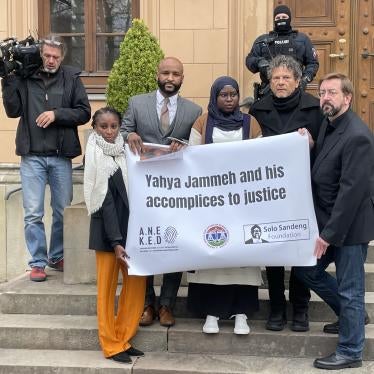(Geneva) – A Swiss court’s conviction of the former Gambian Interior Minister Ousman Sonko for crimes against humanity is monumental for Gambian victims of atrocity crimes during the rule of Yahya Jammeh, Human Rights Watch said today. The verdict is a major achievement for Switzerland’s efforts to hold accountable those responsible for grave crimes committed abroad.
On May 15, 2024, the Swiss Federal Criminal Court in Bellinzona convicted Sonko and sentenced him to 20 years in prison for his role in crimes against humanity relating to torture, illegal detentions, and unlawful killings between 2000 and 2016 during then-President Jammeh’s administration. Sonko is the second person convicted in Europe for international crimes committed in Gambia.
“Ousman Sonko’s conviction is a landmark moment for Gambian victims of brutal crimes under Yahya Jammeh’s rule,” said Balkees Jarrah, associate international justice director at Human Rights Watch. “The verdict should catalyze justice efforts in Gambia and further bolster Swiss prosecutors to continue to pursue international atrocity cases.”
Sonko’s trial was possible because Swiss law recognizes universal jurisdiction over certain serious international crimes, allowing for the prosecution of these crimes no matter where they were committed and regardless of the nationality of the suspects or victims. Sonko is the highest-ranking former government official to be convicted on the continent under the principle of universal jurisdiction, Human Rights Watch said.
Swiss authorities arrested Sonko in Bern on January 26, 2017, the day after a Swiss nongovernmental group, TRIAL International, filed a criminal complaint against him. The Swiss Attorney General’s office filed an indictment against Sonko on April 17, 2023. The prosecution, representatives of victims who were formal parties to the proceeding known under Swiss law as private plaintiffs, and the defense presented arguments during the trial, which opened on January 8 and closed on March 7. A number of witnesses, as well as Sonko himself, testified during the proceedings. TRIAL International provided daily highlights of the hearings.
Over the past two decades, the national courts of an increasing number of countries have pursued cases involving war crimes, crimes against humanity, genocide, torture, enforced disappearances, and extrajudicial executions committed abroad. Despite having solid legislation to pursue such cases, judicial officials in Switzerland have been criticized in the past for lagging behind other European counterparts. Nevertheless, over the past few years, Swiss authorities have pursued a number of universal jurisdiction cases involving alleged crimes in Liberia, Algeria, and Syria.
Members of the media, civil society representatives, and the general public were able to attend the trial in person. However, remote access to the proceeding was not available, posing problems for victims and affected communities in Gambia to follow the case. The media reported that the Swiss court did not cover the private plaintiffs’ costs to attend the entire trial, only the days they presented evidence in the courtroom, hindering the ability of plaintiffs to attend key hearings, including the delivery of the verdict. Human Rights Watch research in other situations has shown that inadequate outreach to affected communities can undermine the impact of accountability efforts for serious international crimes.
Another concern was whether Gambians could follow and understand the proceedings, which were conducted in German. Human Rights Watch monitored five court sessions and noted that the interpretation provided from German into English, a language understood by the accused and Gambian communities, was not comprehensive. On the final day of the trial, Sonko expressed his concern that crucial steps of the proceeding, such as the parties’ closing arguments, were not accompanied by English interpretation. The court made the conclusions of the judgment available in English. Swiss authorities should ensure that future universal jurisdiction cases are fully accessible to the accused and affected communities, including by providing adequate interpretation, even if not legally required.
Under Jammeh’s 22-year rule, the government carried out systematic oppression against any real or perceived opponents to maintain political power. The government targeted journalists, human rights defenders, student leaders, religious leaders, political opposition members, judiciary officials, lesbian, gay, bisexual, and transgender (LGBT) people, and security force personnel, among others. Those apprehended were subjected to torture, extrajudicial killings, enforced disappearance, and sexual violence. Many of these human rights violations were brought to light during the hearings of Gambia’s Truth, Reconciliation and Reparations Commission (TRRC), which was set up in 2018.
Since Jammeh’s fall, Gambia’s government has brought only two prosecutions for Jammeh-era crimes. In December 2021, the final report of the TRRC found that Jammeh and 69 of his associates committed crimes against humanity, and called for their prosecution. In May 2022, the Gambian government accepted the TRRC’s recommendation for accountability.
On April 22, 2024, in a pivotal move toward justice, the Gambian national assembly approved two bills to further the creation of a Special Prosecutor’s Office and a hybrid court with the Economic Community of West African States (ECOWAS) to try the most serious crimes.
“Victims of Jammeh-era crimes are entitled to justice and Sonko’s conviction is a step closer to that goal,” Jarrah said. “The verdict underscores the importance of the Gambian government and ECOWAS following through swiftly on establishing an impartial and independent hybrid court to widen accountability’s reach in the country.”







